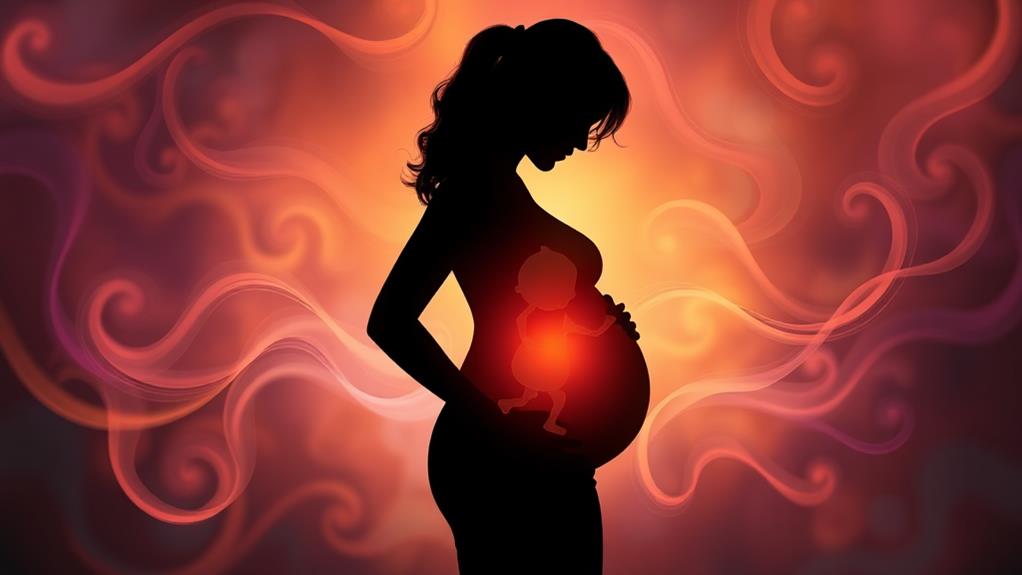Crying During Pregnancy? Here’s How It Affects Your Baby
You might find yourself crying more often during pregnancy, and that's completely normal, given the hormonal shifts and various stressors you face. However, it's crucial to understand how these emotional responses can influence your baby's development. The hormones triggered by your tears create an environment that your little one can sense, potentially shaping their emotional landscape even before birth. What does this mean for your baby's well-being? Exploring the intricate connection between your feelings and your baby's growth reveals surprising insights that could change how you approach this unique time.
Emotional Changes During Pregnancy

You might feel a mix of excitement, anxiety, and even sadness.
These emotional changes can be surprising, especially if you weren't expecting them. Maybe you're feeling overwhelmed about becoming a parent, or perhaps you're worrying about the labor process. It's all part of the journey!
Don't forget, it's okay to cry. Sometimes, a good sob can help release built-up stress.
Plus, your friends and family are there to support you through this rollercoaster ride. Share your feelings, laugh about the silly moments, and don't hesitate to ask for help when you need it.
Understanding Crying Triggers
Crying during pregnancy can stem from a variety of triggers that range from hormonal changes to everyday stressors.
First off, those hormones are no joke! Your body's going through a whirlwind of changes, and that can make you feel more emotional than usual. You might find yourself tearing up over a cute puppy video or an old movie you used to love.
Then there are the daily stressors. Whether it's worrying about your baby's health, dealing with work, or just trying to find the perfect name, it can all build up. Sometimes, it feels like you're on an emotional rollercoaster, and that's okay!
Don't forget about physical discomfort, too. If you're feeling tired, achy, or even just a bit nauseous, those feelings can trigger tears as well. It's your body's way of saying, "Hey, I need a break!"
Impact on Fetal Development

Emotional fluctuations during pregnancy can have significant implications for fetal development. When you experience strong emotions, whether it's joy or sadness, your body releases hormones that can impact your baby. These hormones travel through your bloodstream and reach your little one, affecting their growing brain and body.
For example, if you're feeling stressed or anxious, your baby might also feel the effects. Studies show that high levels of stress hormones can lead to changes in fetal heart rate and even affect their growth. It's like your emotions are a radio station, and your baby is tuning in!
On the flip side, positive emotions can create a soothing environment. When you're happy, your body releases feel-good hormones that can help your baby grow and develop in a healthy way.
Bonding Between Mother and Baby
Bonding between mother and baby is a profound experience that begins early in pregnancy. From the moment you feel that first flutter, a magical connection starts to blossom. Your baby can sense your emotions, even if they're still in your belly. When you cry, it's not just tears; it's a way for your baby to feel your feelings.
As you navigate through the ups and downs of pregnancy, your baby hears your heartbeat and the sound of your voice. These familiar sounds help create a sense of security. You might even find yourself talking or singing to your little one, which isn't only sweet but also builds that special bond.
Crying, although tough, can also be a release. It's okay to feel overwhelmed sometimes. Remember, your baby picks up on your emotions, so expressing them helps strengthen your connection.
Plus, it's a great reminder that you're human!
Long-term Effects on Emotional Health

While it's natural to experience a range of feelings during pregnancy, the long-term effects of crying and emotional fluctuations can considerably impact your mental health. When you're feeling overwhelmed, it's normal to shed a few tears. But if those tears turn into a regular thing, you might find yourself facing some challenges down the line.
Crying and stress can lead to feelings of anxiety or depression, which can stick around even after your baby arrives. It's like carrying a heavy backpack—if it's filled with worries, it can weigh you down. You might struggle with mood swings or feel like you're on an emotional rollercoaster, and that's no fun!
Moreover, your emotional state can influence how you bond with your baby. If you're feeling low, it might be harder to connect.
Remember, it's okay to ask for help. Sharing your feelings with friends or family is like finding a buddy to help you carry that backpack. You're not alone in this journey, and understanding how your emotions can affect you helps you take steps towards better mental health.
Coping Strategies for Expecting Mothers
Feeling overwhelmed during pregnancy is common, and finding ways to cope can make a significant difference. First, don't hesitate to share your feelings with someone you trust. Talking to friends, family, or even other expecting moms can help lighten the emotional load. Remember, you're not alone in this journey!
Next, try to carve out some "me time." Whether it's reading a book, taking a warm bath, or enjoying your favorite snack, these little moments can refresh your spirit.
Also, consider gentle exercises like yoga or walking. They're great for boosting your mood and keeping your body active.
Meditation can help calm your mind, too. Even just a few deep breaths can do wonders when you're feeling anxious. Plus, keeping a journal lets you express your thoughts and feelings. It's a great way to process everything swirling around in your head.
Lastly, don't forget to laugh! Watch a silly movie or listen to funny podcasts. Laughter really is the best medicine.
When to Seek Professional Help

Many expecting mothers experience a range of emotions during pregnancy, but knowing when to seek professional help is essential. If you find yourself crying more than usual or feeling overwhelmed by sadness, it might be time to reach out for support.
Don't worry; you're not alone in this! Pregnancy can be a rollercoaster of feelings, and it's perfectly okay to seek help when things get tough.
Watch for signs that indicate you may need to talk to a professional. If your emotions interfere with your daily life, like work or relationships, that's a big red flag.
Also, if you're feeling hopeless, anxious, or have trouble sleeping, don't hesitate to ask for guidance. Remember, it's not a sign of weakness; it shows strength to recognize when you need extra support!
You can start by talking to your doctor, midwife, or a therapist specializing in pregnancy and postpartum issues. They can help you find the right strategies or treatments for your situation.
Supporting Partners During Pregnancy
Supporting a partner during pregnancy is essential for both emotional well-being and relationship strength. This journey can be filled with excitement, but it also brings challenges. Your partner might feel overwhelmed, moody, or anxious. It's important to be there for them, listening to their feelings and offering comfort. Sometimes, just a hug or a simple "I'm here for you" can make a world of difference.
You can also help by sharing responsibilities. If your partner is feeling tired or sick, pitch in with chores or cooking. Remember, teamwork makes the dream work! Encourage them to take breaks and enjoy some self-care. Maybe suggest a relaxing movie night or a walk in the park.
Don't forget to share your feelings too! It's a big change for both of you, and discussing your hopes and worries helps strengthen your bond. Plus, a little humor can lighten the mood—who doesn't love a good dad joke, right?
Lastly, remind your partner that it's okay to cry or feel upset. Emotions are part of this beautiful adventure. Together, you'll navigate this journey, creating lasting memories and a stronger relationship.














Post Comment